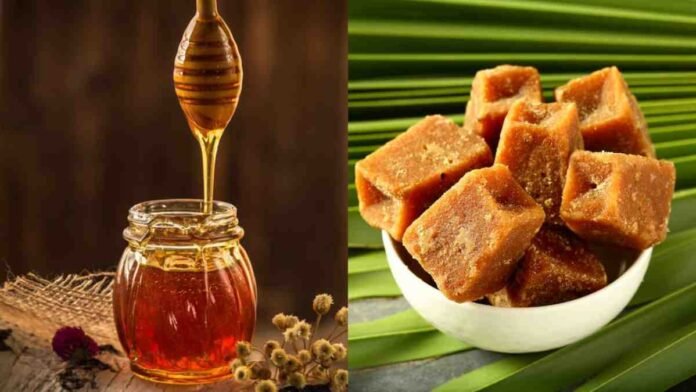When it comes to weight reduction, food choices play an important part in shedding stubborn fat. When it comes to diets, there are numerous limits, alterations, and adaptations to consider. One of the most common modifications people are urged to make is to alter their source of sweetness, particularly from refined sugar to natural sugars. Natural sweeteners include jaggery vs honey, which are frequently seen as healthier alternatives to pure sugar.
But which of them, jaggery or honey, is beneficial for the body while attempting to reduce weight? Both jaggery and honey have advantages and cons, so it’s important to understand how they affect weight reduction.
Jaggery is nutritious
Jaggery is a kind of raw sugar derived from sugarcane or palm sap. It is commonly used in many Indian dishes and has recently gained popularity as a component in cakes and biscuits. Jaggery contains traces of mineral components such as iron, magnesium, potassium, and calcium, making it a healthier alternative to white sugar.
Furthermore, jaggery provides vital minerals like iron and magnesium, which promote overall health and well-being. The primary function of magnesium is fat metabolism. When reducing weight, iron supplementation helps with the energy requirements for an active lifestyle, and iron is rich in jaggery. Traditionally, jaggery was used to improve digestion, ease constipation, and help in nutrition absorption and metabolism. It is claimed to cleanse the liver and remove toxins from the body, which is beneficial because detoxification is said to enhance metabolism significantly.
100 grams of jaggery has 383 calories, 98.5 grams of carbs, and 0.4 grams of protein. Jaggery is mostly made up of sucrose, and its glycemic index (GI) ranges from 84 to 94, depending on quality. Foods with a high GI can induce quick increases in blood sugar levels, leading to overeating or cravings and making it difficult to sustain a calorie deficit for weight reduction. Jaggery is frequently advertised as a healthier sugar replacement, however, its high-calorie content means it should be used in moderation.
Honey has a lower GI than jaggery
Honey, another natural sweetener, has been utilized for ages for its nutritional and therapeutic benefits. Bees create it from floral nectar, and it is made up of carbohydrates, water, enzymes, and trace amounts of vitamins and minerals. Honey’s carbohydrates are mostly glucose and fructose. The glycemic index varies from 45 to 64, depending on the type of honey. Foods with a lower GI are less likely to produce blood sugar surges, making them better for weight reduction. This delayed release of glucose into the circulation promotes steady energy levels and minimizes the incidence of hunger sensations and cravings.
100 grams of honey has 304 calories, 82 grams of carbs, and 0.3 grams of protein. Honey includes antioxidants such as flavonoids and phenolic acids, which help counteract oxidative stress and inflammation in the body, hence improving metabolic function and aiding in weight control. It contains antibacterial qualities that can help maintain a healthy immune system. Consuming honey with warm water is a typical way to boost metabolism. A greater metabolic rate permits the body to burn more calories, which aids in weight loss attempts.
However, honey includes a high concentration of fructose, which can readily be turned into fat if ingested in excess. Despite having a lower glycemic index than jaggery, moderation is still required.
It is crucial to note that honey vs jaggery are high in calories and should be used in moderation. Neither is a miracle cure for weight reduction, and excessive intake of either might stymie your efforts. Ideally, you should reduce your overall sugar intake and use these sweeteners sparingly.



